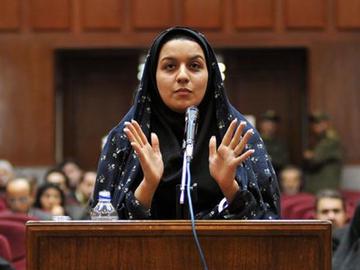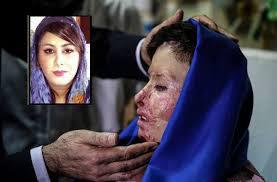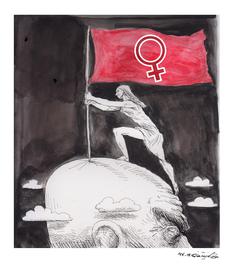Iran prides itself on increased educational opportunities for girls and women. To mark International Women’s Day, Marjan Keypour Greenblatt assesses the reality — and sees a future increasingly hostile to Iran’s women and their rights
As it marked its 40th anniversary, the Islamic Republic boasted the country’s reported increase in literacy and college education among girls and women as one of its most significant accomplishments. But a deeper look at Iranian society reveals alarming social trends that challenge future prospects for Iranian women, positioning them as the country’s most vulnerable population.
The dark forces of poverty, emerging cultural and religious pressures and insufficient governmental programs are deteriorating the living conditions for Iran’s female population. Many girls are drawn to prostitution, married off early, and are deprived of an education and other opportunities. Sexual assault and rape are regular occurrences. In a legal and religiously hostile environment for women and girls, poor observance of modesty rules or the hijab are often perceived as “invitations” for such violent acts.
Even when young girls are raped in Iran, there is not the same level of outrage among Iranian officials as there is when a similar incident occurs in the West.
Last year at least 40 girls and women reported that they had been sexually assaulted in Iranshahr, southeastern Iran, home to a large population of ethnic Baluch-Iranians. The actual number of assaults was likely higher — these accounts were simply from the women and girls who felt they could report what had happened to them. In response, officials suppressed the news out of a fear of a backlash, stating that “raising public anxiety is a crime.”
Prostitution has increasingly become a way of escaping poverty. Some people get away with prostitution legally by finding religious ways to participate in the government-approved “temporary marriages” or sigheh, in which involved parties — not always consensually — arrange for a religious cleric to authorize a temporary provision so a man can have sex with a woman in return for money, shelter or other favors. For those who are less compliant with such arrangements — for example addicted and unemployed husbands — wives can be forced to engage in “illegal” prostitution in order to earn a living.
An extension of this practice leads poverty-stricken families to “sell” their young daughters’ virginity to aspiring men. Rather than addressing poverty and instituting non-punitive interventions to address the emerging problems, the law has regressed to accommodate this desperate practice by lowering the age of marriage to age 9. This legal “adaptation” removes the social taboo and criminal element of child abuse and the sex trade, giving impoverished families relief from the burden of caring for another member of their family.
The legal system, which already disadvantages women, further exacerbates the situation. To note a few examples, in the case of domestic abuse, the burden of proof falls on the woman, whose testimony is valued as half of that of a man. In cases of rape and sexual assault, a female plaintiff has to expose herself to humiliating “investigation” processes that include invasive “virginity exams." Furthermore, the system requires witnesses in order to prove rape in the Islamic Republic of Iran. Largely due to the lack of such witnesses, Reyhaneh Jabari was executed for killing a man who tried to rape her.
Random acts of violence against women, such as the pervasive spraying of acid on women in big cities, by and large resulted in insufficient consequences for the perpetrators. Isfahan’s Provincial Governor Rasoul Zargarpour noted that these acid attacks had nothing to do with a lack of compliance regarding the Islamic dress code.
Mandatory hijab goes beyond the physical limits that are imposed on women. Women aren't permitted to travel without the consent of a male “guardian.” Female participation in the labor force is discouraged. In colleges and universities, in the inheritance laws, and regarding child custody, women are systematically discriminated against.
Arguably because of all these pressures and the lack of government intervention, girls and women are frequent victims of violence. When women are raped, the law is not on their side. Many victims subject themselves to self-inflicted violence, such as suicide and self-immolation.
The pain and suffering endured by the women of Iran is agonizing and real. True, there are moments of hope and progress when a government-approved hijab-covered woman makes the international news as a champion of a certain athletic or academic competition, or when women are allowed to enter a stadium before an international audience. True that from time to time, American women will talk about how the “hijab has liberated” the Iranian women. True that, given the gravity of the child marriage crisis, any government effort to raise the minimum age to 13 is regarded as a lesser evil. But by and large, women of Iran are living a dark and harrowing life that most are keeping quiet.
Yes, an increase in the number of women with college degrees is an accomplishment worth celebrating, not just in Iran, but anywhere in the world. But unless the repressive and systematic persecution of women is eliminated and their urgent needs are addressed, women and girls will continue to grapple with questions of life and death rather than worrying about college entrance exams.
Born and raised in Iran, Marjan Keypour Greenblatt is the founder of the Alliance for Rights for All Minorities (ARAM-Iran), a human rights network that advocates for Iranian women, LGBT, ethnic and religious minorities. Follow the alliance @ARAMalliance and Marjan Keypour Greenblatt @MarjanKG
visit the accountability section
In this section of Iran Wire, you can contact the officials and launch your campaign for various problems






















comments